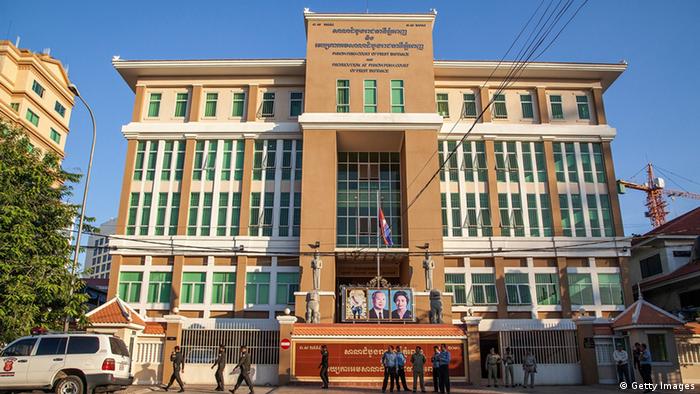New Cambodian laws cast doubts over foreign aid
Cambodia’s Senate has passed a set of laws that would cement the
government's control over the country’s courts. The move also raises
questions about the millions of dollars foreign donors have spent on
judicial reform.
Deutsche Welle | 13 June 2014
The new laws, which await only a rubber stamp from the king, would give
the government more administrative control over the judiciary. The move
has the potential to further erode an already weak legal system, but
also raises questions about donor accountability in a country where tens
of millions of dollars have been spent on judicial reform.
Ear, who is the author of "Aid Dependence in Cambodia: How Foreign
Assistance Undermines Democracy," tells DW the problem has been
particularly protracted in Cambodia, where the executive wields vast
control.
The expert points out that democracy is undermined when, for instance,
property rights are introduced, but then twisted to grab land from the
poor and hand it over to the rich.
"Another example is when a Royal School of the Magistracy is created to
train judges but then becomes immediately embroiled in a bribes for
seats scandal," he said. "Donors can help, but so far they've been
outwitted at almost every turn."
The fundamentals
First proposed shortly after the signing of the Paris Peace Accord in
1991, the "three fundamental laws," as they are commonly called, were
envisioned as a way to ensure an independent judiciary.
In 2005, donors and the government ostensibly began a drafting project
in earnest. Though progress was sporadic and slow, the draft they
produced contained promising provisions. But after eight years of work,
the laws were abruptly pulled out of the hands of the working group and
handed over to the Ministry of Justice.
While there, checks and balances were stripped out and the Minister of
Justice granted control over the administration. "One article which
initially said that the judiciary would not be under the power of
executive or legislative or any political party, was later removed from
the approved version," said Duch Piseth, a Trial Monitoring Project
Coordinator at the Cambodian Center for Human Rights, adding that that
the new laws provided much more power to the Ministry of Justice.
In recent months, as the Law on the Organization of the Courts, the Law
on the Statute of Judges and Prosecutors, and the Law on the
Organization and Functioning of the Supreme Council of the Magistracy
moved through the final stages, legal experts and rights groups grew
increasingly agitated.
UN special envoy Surya Subedi said last month that he was "deeply
concerned" about the content of the laws, particularly about the
Ministry of Justice’s strong hand.
"In order to preserve the independence of the judiciary, no member of
the executive should be involved in issues related to the appointment
and promotion of judges or any disciplinary matters affecting them,” he
wrote in a statement.
Failed models
The judicial law debacle comes on the heels of an even larger, though far less-publicized failed rule-of-law project on
"model courts." In 2004, the government launched a legal and judicial
reform strategy that included a model court proviso. Donors,
particularly Australia provided vast funds and resources to a project
that would turn four courts into ideal bodies to be emulated by the rest
of the nation’s judiciary.
Over the course of seven years, Australia, with the assistance of
Denmark and the US, toiled to set up the program, even with increasing
signs of resistance from the government.
"The process of developing the legal and judicial reform strategy was
very good and developing the model court program was fine. But when it
came to implementation, that’s when it started having problems," said
Michael Engquist, a consultant who previously worked on the program as
an advisor with the Danish International Development Agency.
In a damning report about the efficacy of its aid programs, the
Australian government blasted the model court program and implied donor
countries may have been foolish for believing the government strategy
was a true reflection of their intentions.
"Like many Cambodian strategies, the Legal and Judicial Reform Strategy
appears to have been written to meet the expectations of donors, without
any real commitment to its implementation," the auditors wrote in their
December 2012 report.
"Some of the change processes promoted… particularly the model courts,
were too sophisticated for the counterparts to manage. More
fundamentally, they assumed that a lack of institutional capacity was
the binding constraint on improving the justice system. In fact, the
constraints are largely political."
The government has repeatedly downplayed such criticisms.
After the last election, which the opposition accused the ruling party
of stealing, the country’s strong-arm Prime Minister Hun Sen vowed that
judicial reform would be a cornerstone of the current mandate.
Engquist, for his part, remains skeptical. Asked if judicial reform is a
good area for donors to invest money, he laughed. "When you put it this
way, yeah I’m disappointed of course. There’s been a lack of political
will, definitely in this area."




No comments:
Post a Comment